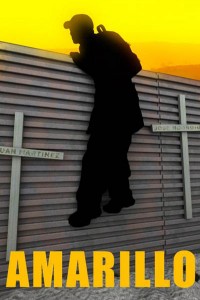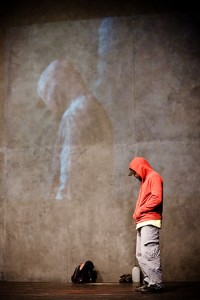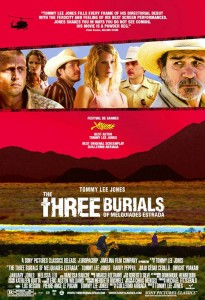AMARILLO
Screening and panel discussion with Ruth Wikler-Luker, Lynn Stephen, and director Jorge Vargas (via Skype)
4:00 p.m. Jordan Schnitzer Museum of Art Lecture Room FREE

Mexico
Presented by Teatro Línea de Sombra
Directed by Jorge A. Vargas
Produced by Alicia Laguna
Music by Jorge Verdin
Cast: Raúl Mendoza, Alicia Laguna, María Luna Torres, Vianey Salinas, Antígona González, Jesus Cuevas
Running time: Approximately 60 minutes

A man departs for the US-Mexican border and vanishes before reaching his destination: Amarillo, Texas. Through stunning projected images, bilingual monologues and a sea of displaced objects and natural elements, director Jorge Vargas and his collaborators in Teatro Línea de Sombra reconstruct this journey in a multimedia performance that travels imagined landscapes of geography and cultural identity. The absent man takes on multiple faces and names as he comes to symbolize the thousands of disillusioned travelers who have suffered a similar fate. Using the conventions of contemporary performance to give voice to the plight of individuals, Amarillo touches on the complex nature of individual and national identity in a time of exodus, both for those who leave and those who are left behind. The film of Amarillo’s theatrical performance, prepared by Seattle’s On the Boards contemporary arts company, retains the immersive and sensual atmosphere of the live performance.
Founded in 1993 by Jorge A. Vargas, Teatro Línea de Sombra is one of the most celebrated Mexican theater ensembles and has received international acclaim. Their roots in political theater and ensemble collaborations result in performances with visceral imagery, evocative soundscapes, and rich storytelling. Twice awarded Best Research Theatre in Mexico (2000 and 2005), they have toured numerous countries in the Americas and Europe, and are permanently touring their home country.
Ruth Wikler-Luker of Boom Arts will moderate the post-film discussion with Lynn Stephen (UO Department of Anthropology) and Jorge Vargas, director of Amarillo, who will join via Skype.
Co-presented with Boom Arts and OntheBoards.tv.
THE VIDEO ART OF CHIP LORD
 With visiting artist Chip Lord
With visiting artist Chip Lord
7:00 p.m. Jordan Schnitzer Museum of Art Lecture Room FREE
As a member of Ant Farm (1968-1978), Chip Lord produced the video art classics Media Burn and The Eternal Frame as well as the Cadillac Ranch sculpture in Amarillo, Texas. Since 1980, he has worked independently and in collaboration, producing video installations and single-channel videotapes. Lord presents and discusses his work, which straddles documentary and experimental genres, often mixing the two.
Awakening from the 20th Century (1999, 35 min.)
This video essay contends with the collision between the actual and the virtual in the city of San Francisco. “Is life becoming virtual?” Lord asks. “Are we witnessing the end of the City?” These questions are taken up by six prominent writers, musicians, and multi-media workers, who describe their own shifting relationships to technology and public space within the city.
Une Ville de l’Avenir (2011, 12 min.)
The modernism of La Defense provides the setting for a revisiting of Godard’s Alphaville and our dreams and nightmares of the City of the Future.
In Transit (2011, 22 min.)
An observed video portrait of the spaces of air travel, In Transit moves from San Francisco to Shanghai, Beijing to London, and from Frankfurt to Mexico City to Los Angeles.
Schnitzer Museum visitors are invited to see the artifacts of Ant Farm that are on display in the West of Center exhibition. Lord will speak about Ant Farm briefly Wednesday, April 17 and more extensively on Thursday, April 18 in Lawrence Hall at 6:00 p.m.
THE THREE BURIALS OF MELQUIADES ESTRADA
With screenwriter Guillermo Arriaga
7:00 p.m. Bijou Art Cinemas
Tickets: $6 sr/stu; $8 general

USA, 2005
Directed by Tommy Lee Jones
Screenplay by Guillermo Arriaga
Cinematography by Chris Menges and Hector Ortega
Editing by Roberti Silvi
Music by Marco Beltrami
Cast: Tommy Lee Jones, Barry Pepper, Julio Cedillo, Dwight Yoakam, January Jones
Running Time: 122 minutes
The Western is a quintessentially American film genre. Though its demise is frequently announced, its periodical resurgences demonstrate the Western’s power to revive the myths and confront the realities of this nation. In The Three Burials of Melquiades Estrada, Tommy Lee Jones is completely at home in the saddle as a first-time director and protagonist. Three Burials is a classic story of revenge and redemption, grounded in the contemporary environment of the Texas-Mexico border. Flashbacks construct the friendship and trust between best friends Melquiades, a Mexican farmhand, and Pete, a Texas ranch foreman. As Pete journeys across the border to repatriate the murdered Melquiades’ body to his hometown of Jimenez, Mexico, the film explores the men’s shared humanity.
Guillermo Arriaga has created his finest screenplay, one that is as complex as the characters whose lives are intertwined at the border. Tommy Lee Jones’s performance is extraordinary, earning him a Best Actor Award at the Cannes Film Festival (2005), where Arriaga also won the Best Screenplay award. Authentic in every way, filled with the images and sounds of the region, The Three Burials of Melquiades Estrada is a parable, a Western, and a road movie, with a powerful, dramatic drive that challenges the audience to confront the moral complexities of relationships across borders.
